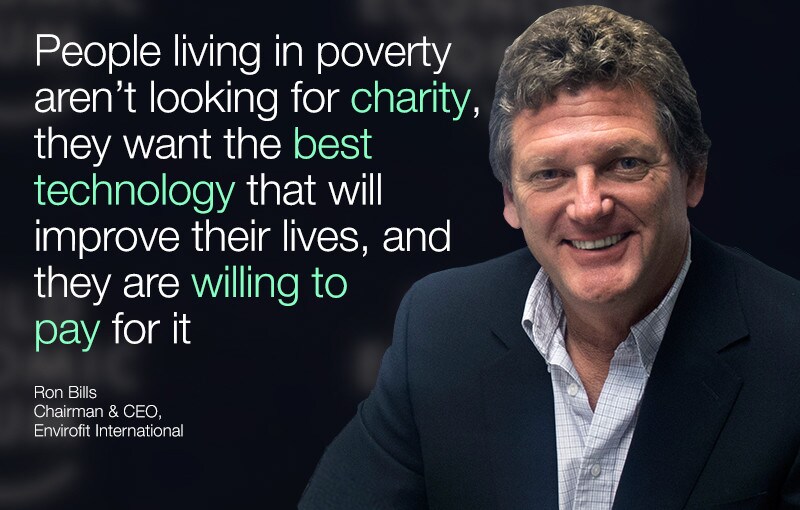Poor people don't need your charity – they need you to listen

'Regardless of how much money you have, people don’t like being patronized' Image: Envirofit
You drive an old car that your parents gave you. It’s the same car their parents used before them. This car doesn’t get good mileage, emits a lot of exhaust fumes, and isn’t very pretty to look at, but you know how it works and it gets you where you need to go. You drive your car every day, and most of your friends and family drive cars almost identical to yours. It’s what you’re used to.
One day a group of people you don’t know show up at your house and give you a new car. You didn’t ask them for a new car, but they insist that it will be better for you than your old one. They say that it goes faster than your old car, will cost less to drive, and emits less fumes.
You’re curious so you take it for a test-drive. Getting into it feels strange because it sits lower than your old car and the door handle isn’t where you think it should be. You try to add some fuel only to realize that it doesn’t use the same gas as your old car. After figuring these issues out, you’re finally able to get it on the road. The new car drives OK – it is a little quicker, and it does get a little better mileage. But then you hit a small pothole and hear a loud clang. The engine begins to make a strange noise, and the new car stops running a block from your house.
You walk back home and look for the people who gave you the new car so that you can tell them what happened, but they are gone. You write them a letter explaining what happened and how they could make the new car better. A response arrives three weeks later saying that the new car giveaway was a one-time programme and that there is no more money available to make the car better, or fix the one they gave you. However, it says that you should keep driving the new car anyway, and that you’re lucky to have got it. You keep driving your old car.
Too much preaching, not enough listening
For decades, this was how cookstove programmes were run. Each year more than 4 million people die from cooking over inefficient burning open fires – more than HIV, Malaria, and TB combined. The global community responded by giving people low-quality products whose design they didn’t have a say in, and told them that was all there was. Cookstove customers are often poor by global standards, and because of this there can be an inclination to solve problems for them instead of with them.
Regardless of how much money you have, people don’t like being patronized. Eight years into running a social enterprise, I have seen first-hand the good that business can do in alleviating global problems. It was only after meeting our customers first-hand to listen to their needs and design a cookstove that fit their lifestyle that we found success.

From beneficiaries to consumers
In 2007, Envirofit took a new market-based approach to developing cookstove products and programmes. Shifting the perspective, we approached people not as beneficiaries but as consumers – with desires and aspirations. We structured our model on building relationships and designing products that fit their everyday cooking needs, and are adapted to the challenging environments in which they live. By making fast-cooking, cost-saving stoves that are durable and affordable, we were able to prove a value for developing a market for clean energy stoves. It’s a wonderful feeling when people ask to buy your stove because they believe it will benefit their lives, rather than convincing them to accept a burden for free. Using market mechanisms, Envirofit has been able to sell more than 1 million stoves across the globe, impacting 5 million people.
Proving a value and building a relationship has also allowed us to invest in improving our products for our customers in ways that one-time giveaway programmes and charities often can’t. The clean cookstove market has grown crowded in the past eight years, with new markets expanding across Asia, Africa and Latin America. This means that multiple companies have realized the potential of the cookstove market and are working their hardest to provide cookstove customers with the best products money can buy, which is what they deserve.
The author is part of the 2016 class of Schwab Social Entrepreneurs.
Have you read?
Don't miss any update on this topic
Create a free account and access your personalized content collection with our latest publications and analyses.
License and Republishing
World Economic Forum articles may be republished in accordance with the Creative Commons Attribution-NonCommercial-NoDerivatives 4.0 International Public License, and in accordance with our Terms of Use.
The views expressed in this article are those of the author alone and not the World Economic Forum.
Stay up to date:
Sustainable Development
Related topics:
Forum Stories newsletter
Bringing you weekly curated insights and analysis on the global issues that matter.
More on InnovationSee all
Awais Ahmed and Srishti Bajpai
November 11, 2025







